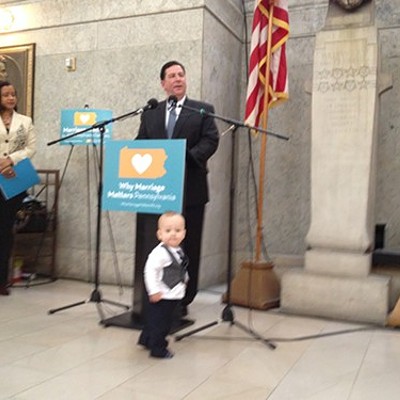Wednesday, December 11, 2013
Vote on Produce Terminal delayed ... but not before Burgess drops a reference to apartheid
The city's historic-preservation laws allows buildings to be nominated as historic by third parties -- without the consent, and even over the objections, of the owner. Such a designation, if approved by council, means city officials must approve future exterior changes to the structure; in this case, advocates of preserving the Terminal hope to prevent the Buncher Company from lopping off the western third of the building as part of a riverfront-development project. But as he has before, Burgess took issue with third-party efforts to secure a designation. He likened the process to "someone coming to your house and saying, 'Your daughter can't wear red'" or "'I like your car; you can't put a sunroof in it.'"
"That sounds too much like what happened in South Africa," Burgess added. "...I feel very passionately about this."
Well, I would think so.
Burgess pledged that next year, he'd be offering legislation to adjust the process, saying that "If the city believes that this property has historic value ... the city should be willing to buy the property at fair-market value," compensating the owner for the loss of control.
Burgess' reservations about the historic-designation process are nothing new: For example, he's voiced concerns about it in the face of a failed campaign to preserve the Civic Arena -- a building that had long been a symbol of urban redevelopment gone amok in black communities. In 2012, Burgess sponsored a bill that would have prevented third parties from seeking historic nominations for properties they don't own.
But as Burgess himself acknowledged, questions about individual property rights aren't actually relevant to this particular nomination. While the Buncher Company has a lease on the structure and hopes to acquire the Produce Terminal outright, the building is owned by the Urban Redevelopment Authority, a government agency. Most of today's debate, in fact, turned on how much ability the city would have to dictate the terms of that sale without a historic designation.
Gross, for one, favored the nomination, calling the terminal "a historic structure, a very meaningful structure." This was her first hot-button vote -- she'd been coy about her stance on the issue during her special-election campaign this fall -- and she walked a careful line between the two camps on the issue. She noted that neither Buncher or the preservationists who opposed its plan wanted to demolish the building completely. Both, meanwhile, acknowledged "that some modifications are going to be needed." The historic designation, she said, "does allow us to allow modifications to the building," without allowing it "to just go into private hands, where we are no longer able to steward it without any oversight."
Councilor Daniel Lavelle, whose district had included the Strip before the most recent redistricting, countered that before Buncher acquired the structure, council would have to approve the sale, and could attach riders to the agreement that would address preservation concerns. We have the ability to put additional restrictions into the actual sale," he said.
Lavelle received some confirmation from the URA's solicitor, George Specter. But assistant city solicitor Jason Zollars, who was called to the council table for an on-the-spot legal opinion, couldn't say just how much leverage council would have at that point. "I do have a little bit of a concern" offering an opinion about "what power this council has in terms of dictating contract terms between the URRA and a private party," Zollars said.
Councilor Bruce Kraus said that, without a better understanding of the city's legal footing, he'd have to vote in favor of the historic designation, whose ability to protect the building was more certain. "My gut always tells me in these kinds of situations that it's important to preserve," Kraus said.
(Kraus also later objected to Burgess' castigation of the historic-preservation law. Government routinely tells people what they can and can't do with their property all the time, he argued: "The zoning code exists for a reason.")
Other councilors, among them Theresa Kail-Smith and council president Darlene Harris, also said they had questions about council's legal maneuvering room, and the status of talks between Buncher and historic preservationists who had proposed their own visions for the building. Given those questions, Gross said, "I would prefer that we postpone a week."
Council quickly acceded, presumably out of a tradition of deferring to the councilor representing the area ... and maybe to prevent anyone from bringing up, like, the Nazis.











